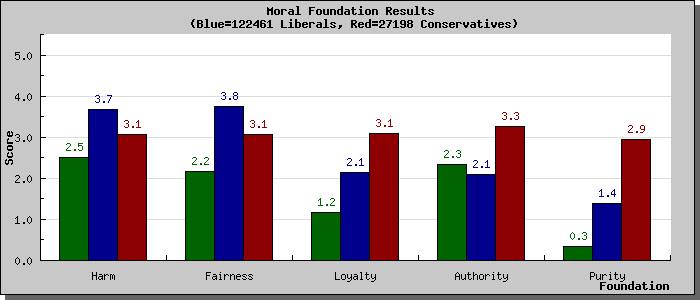I’m very interested in morality, both in the sense of what’s actually moral, and in the sense of what people think is moral. In addition to my interest in moral
Meta-ethical views (self-assessments)
- I consider myself a moral realist (as opposed to a subjectivist or non-cognitivist). In other words, I believe that some moral propositions are true and can be known to be true.
- I consider myself an ethical intuitionist. In other words, I believe that ethical intuitions are an appropriate starting point for the discovery of moral truths.
Normative ethical views
- I subscribe to a mix of deontological and consequentialist ethics.
- I believe in some variant of natural rights or negative rights.
- I tend to be libertarian in my ethical views. For instance, in the Nolan Chart, I am at the top right: I believe in significant personal and economic freedom. My Moral Foundations results are also consistent with a libertarian profile.
- The consequentialist ethics is largely but not entirely utilitarian. I am not a negative utilitarian, i.e., I do not see the avoidance of suffering as an overriding consideration relative to the attainment of positive affect. At the same time, I do see suffering reduction as important.
Views on the relative importance of different living creatures
- I believe that all animals that experience consciousness deserve some moral consideration, though, in light of my focus on negative rights, I think the general obligation to animals is to, where it is not too costly, not cause them unnecessary suffering or deprive them of their life and liberty.
- I consider humans to have greater moral importance than animals, due to a variety of reasons including their more enhanced cognitive development and their greater ability to understand the future.
- I have uncertainty about the relative moral importance of animals, or the sorts of ways it is morally permissible to humans to exploit animals. Like Mike Huemer, I believe that most meat-eating and factory farming are likely unethical, partly because it is feasible for humans to live and flourish without engaging in these activities. I am less certain about other animal-killing activities, such as pest control. Luke Muehlhauser’s 2017 Report on Consciousness and Moral Patienthood says that insects are less likely to have the properties of consciousness than fish, chicken, and other animals humans generally eat.
As you can see from my diet page, I am vegetarian. The reasons for this are primarily habit and health rather than moral concerns, though the moral considerations do influence me somewhat.
Views on the supernatural
I am an atheist and a methodological naturalist, i.e., I do not believe in the existence of a supernatural being, nor do I believe that morality is derived from such a being.
Moral foundations
I took the Moral Foundations Questionnaire at yourmorals.org on August 8, 2010. My scores were as follows. Lower scores indicate that I am less tuned to that dimension and/or consider it less important for my definition of morality.
- Harm/care foundation: 2.5 (mean for liberals: 3.7, mean for conservatives: 3.1)
- Fairness foundation: 2.2 (mean for liberals: 3.8, mean for conservatives: 3.1)
- Loyalty/ingroup foundation: 1.2 (mean for liberals: 2.1, mean for conservatives: 3.1)
- Authority foundation: 2.3 (mean for liberals: 2.1, mean for conservatives: 3.3)
- Purity/sanctity/disgust foundation: 0.3 (mean for liberals: 1.4, mean for conservatives: 2.9)
You can see these numbers presented graphically here or below:
